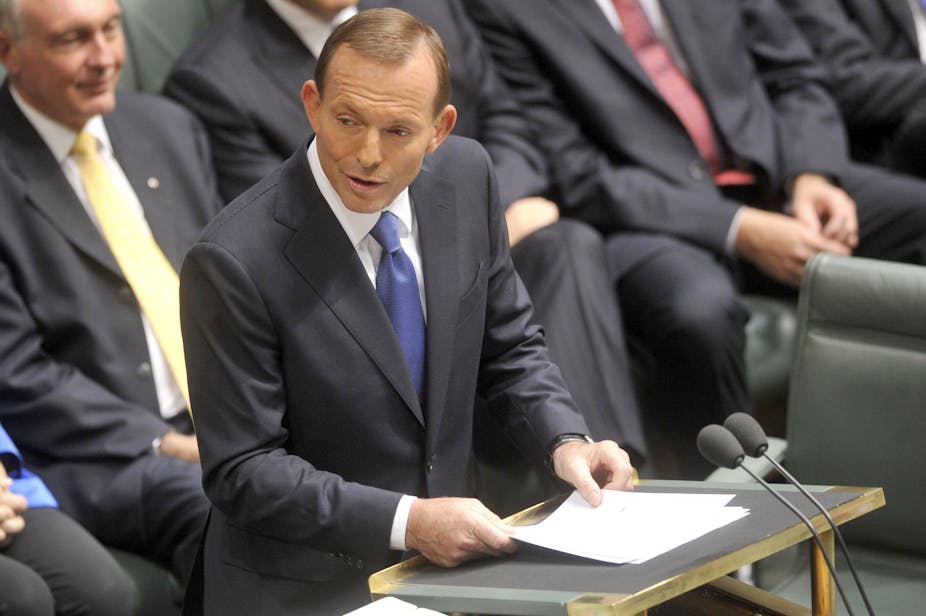In his federal budget reply speech, opposition leader Tony Abbott announced that a putative coalition government would maintain the revised tax-free threshold and other associated carbon tax compensation measures while still scrapping the tax itself.
Abbott told parliament that keeping the compensation would ease the pressure on Australian families.
“The carbon tax will go but no-one’s personal tax will go up and no-one’s fortnightly pension or benefit will go down,” he said.
The coalition has previously said the compensation would not be needed when the carbon tax was repealed, although it had promised that there would be some alternative tax and welfare assistance.
The Conversation spoke with Associate Professor at ANU’s College of Law and Acting Director of the ANU Centre for Climate Law and Policy, Andrew Macintosh, about the political implications and ideological background behind Abbott’s changing position on the compensation measures.
Why has Tony Abbott decided to maintain the compensation but axe the actual tax? Are there political motivations?
There’s the straight politics of wanting to retain popular tax cuts and pension and family tax increases. No politician in an election year ever wants to effectively impose taxes or to raise taxes or to cut benefits. That’s the most obvious explanation. The other explanation is that raising the tax-free threshold is good policy, so I would imagine it would be a combination of both.
So you think it’s more of a vote winner than ideologically driven?
I couldn’t say which one is the primary driver, but certainly both are in play and as I said, no politician wants to raise taxes in an election year.
Do you think it’s economically viable or feasible?
Yes, there’s no doubt that a government has the capacity to have a higher tax-free threshold and to retain the associated benefits of pension increases and family tax benefits. But in order to pay for that they have to make cuts elsewhere, unless they want to run ongoing deficits. At the moment we’re still waiting for the details on exactly where the coalition intends to make those cuts.
Do you think it is a wider strategy by Abbott to make himself seem more constructive in terms of policy, as opposed to the negative light that the Labor party has painted him in?
Definitely, it would be partly a defensive measure. If Abbott decided to get rid of those tax changes and family and pension benefit increases then the current government would have used that as part of a strategy to paint Abbott into a corner, and to accuse him of raising taxes - which is against the ethos of the Liberal-National coalition. So I’m sure that played a part in their decision.
Do you think it will be successful with the voters?
I don’t know if it is going to be the one thing that is going to get the coalition over the line, but at the moment they’ve got a lot of fat between them and losing this election. The Labor party’s primary vote is now in the low-30s and it could even dip below that, so I don’t know if it is going to change anything.
But certainly, as I said before, the coalition will be playing a safety-first strategy in the lead up to the election and this is just one of those things where they have obviously said: “it’s better for us to retain these because they’re popular, they’re also arguably good policies, particularly retaining the tax-free threshold, so we’re going to retain them and make tax cuts elsewhere”.
Where else do you think they’ll make those cuts?
Not sure. That’s one of those things that’s very much up to them. There are all sorts of places where you can make cuts, you know, some of them, people like me will agree with, others won’t agree with them. There’s things like superannuation that could be overhauled, there’s changes in company taxes, there’s a large number of family tax benefits that someone like me would like to see radically overhauled.
But it will very much depend on whether they think, firstly, where they want them to occur from an ideological and policy perspective and then, secondly, what is best for them from a political perspective.
Which would be the more effective approach? Could they win the election maintaining an ideological line, or should they simply stick with what plays well with the public?
It depends on the ideological line. There’s divisions in the Liberal party and the National party, as there are in all political parties, so you have to work out which ideology is dominant. If it is a neo-liberal ideology then that leads to one set of circumstances and if it’s more a modern conservative position then that leads to a completely different set of tax cuts.
Which one do you think is more relevant in the modern context?
A sort of compromised, conservative position is dominant: it was certainly dominant throughout the Howard era. You saw a lot of the family tax benefits and tax cuts that the coalition introduced during the Howard era and a lot of them were certainly nothing like what an economic rationalist or a neo-liberal position would dictate. And I don’t see a lot of evidence of a strict adherence to neo-liberal concepts out of the opposition: certainly not for the last couple of years.
So I would suggest it is going to be more of a compromised conservative position that is driven by politics. That’s the nature of politics I suppose. If you want to be a politician, you have to allow your ideology to give ground to political factors.

